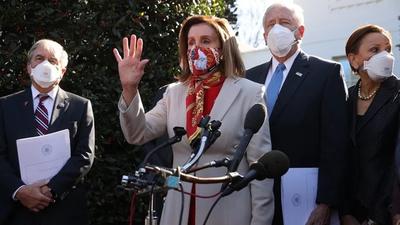
Congressional Democrats are fully mobilized over the Biden administration’s $1.9 trillion stimulus – with House Speaker Nancy Pelosi (D-CA) announcing that her chamber will draft Biden’s bill “before the end of February,” with final passage “before” March 15, according to Bloomberg‘s Jennifer Jacobs and CNN‘s Manu Raju.
"Absolutely,” Pelosi says when asked if coronavirus stimulus will pass by March 15. “Before then.” https://t.co/XPvKN0lOIp
— Jennifer Jacobs (@JenniferJJacobs) February 5, 2021
The White House won’t commit to a timeline on the stimulus, while President Biden told reporters on Thursday with a straight face: “I’m not cutting the size of the checks. They’re going to be $1,400. Period.”
Adding to the urgency was Biden economic adviser Heather Boushey, who told BloombergTV following today’s jobs report: “The numbers that we got this morning really do underscore the cost of inaction,” adding “Without further aid, our economy is going to continue to struggle.”
“I think what’s really important, is that all those kindergarten teachers, those firefighters, those folks who are pulling in $60,000 or so, that they get this aid,” Boushey added, referring to the $1,400 stimulus checks – which are notably less than the $2,000 checks Biden promised, should Democrats regain control of the Senate following January’s special election in Georgia.
Heather Boushey of the U.S. Council of Economic Advisers tells @FerroTV that the January jobs report underscores the need for further "aid"https://t.co/1nviqBVvdh pic.twitter.com/4Xr1oNebdC
— Bloomberg TV (@BloombergTV) February 5, 2021
The current Democratic proposal would send $1,400 payments to individuals earning $50,000 or less, and $2,800 to married couples earning under $100,000. Heads of household earning up to $75,000 would also qualify.
In total, approximately 71% of Americans would receive the full benefit, and other 17% would receive partial benefit, according to Kyle Pomerleau, a fellow at the American Enterprise Institute who specializes in tax policy (via the Washington Post). This is less than Biden’s original proposal which would cap earnings at $75,000 for individuals and $150,000 for married couples.
As JPMorgan noted on Thursday, the Senate voted this morning to adopt a budget measure to fast-track Biden’s bill – paving the way for the fiscal package to pass via Reconciliation. They note that March should be viewed as the most likely time for the bill to pass, whether or not it has the votes to go through the “normal” 60 vote process, or via Reconciliation. Looking forward, the market “will continue to focus on fiscal policy and vaccines as the macro drivers.”
Hilariously, Politico is now reporting that former Treasury Secretary Larry Summers thinks that Biden’s stimulus plan may be too big, and that the overall cost could sacrifice other progressive priorities and harm the economy in 2022, when Democrats will be defending narrow congressional majorities in the midterms.
More via Politico:
For weeks the key economic talking point from the White House has been that the risk of going too small is worse than the risk of going too big. Now comes Summers who says … that might not be true. “[M]uch of the policy discussion has not fully reckoned with the magnitude of what is being debated,” he wrote.
Summers cops to the fact that the 2009 stimulus, which he helped craft, wasn’t big enough to fill the hole in the economy back then. The shortfall was $80 billion a month and the Obama stimulus only filled about half of that.
But in 2021, after the December package of $900 billion, the economy will face a $20-$50 billion-a-month hole. The Biden plan would fill it with some $150 billion a month.
Why does this matter? Two big reasons:
1) A $1.9 trillion stimulus could overheat the economy. Summers warns of “inflationary pressures of a kind we have not seen in a generation, with consequences for the value of the dollar and financial stability.” He notes that these unintended consequences are barely being debated or acknowledged by the White House and Congress, adding that “[s]timulus measures of the magnitude contemplated are steps into the unknown.”
2) The stimulus could wreck Biden’s larger agenda — the one progressives really care about. There are no other long-term structural reforms in the Biden Covid relief package, which is designed only to address the immediate needs of battling the pandemic and repairing the economy.
Summers, who is a boogeyman to progressives, is now in the unusual role of warning that the passage of Biden’s plan could jeopardize the left’s priorities: “If the stimulus proposal is enacted, Congress will have committed 15 percent of GDP with essentially no increase in public investment to address” things like infrastructure, preschool education and renewable energy.
“After resolving the coronavirus crisis, how will political and economic space be found for the public investments that should be the nation’s highest priority?” he added.
Summers isn’t the only economist to raise an alarm about the risks of a too-large stimulus. Buried in a mostly rosy analysis from Brookings this week was a similar warning about the risks to the economy.
Imagine that!
Via Zero Hedge
